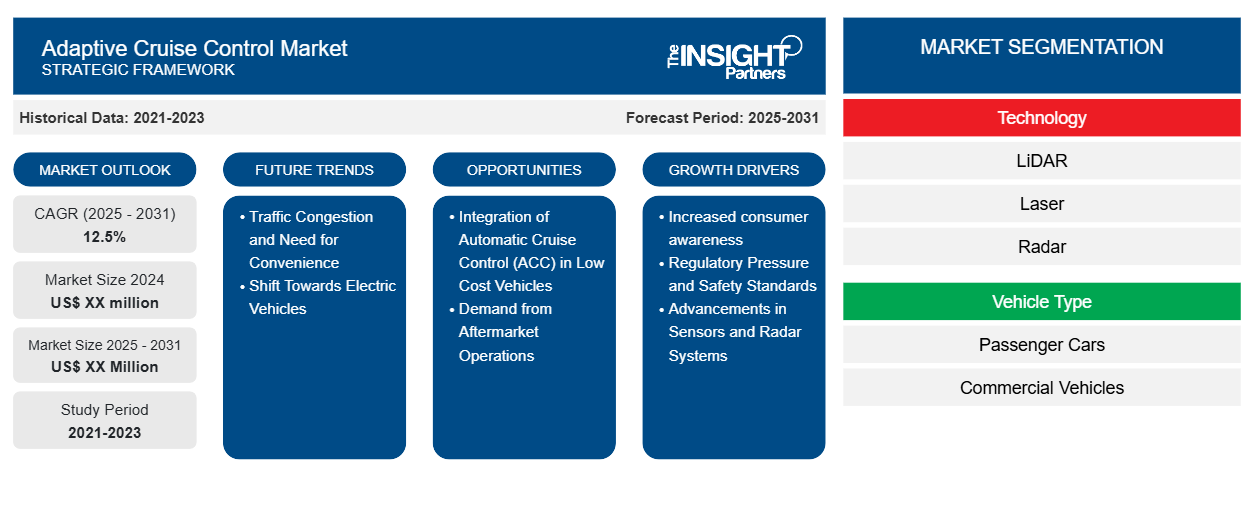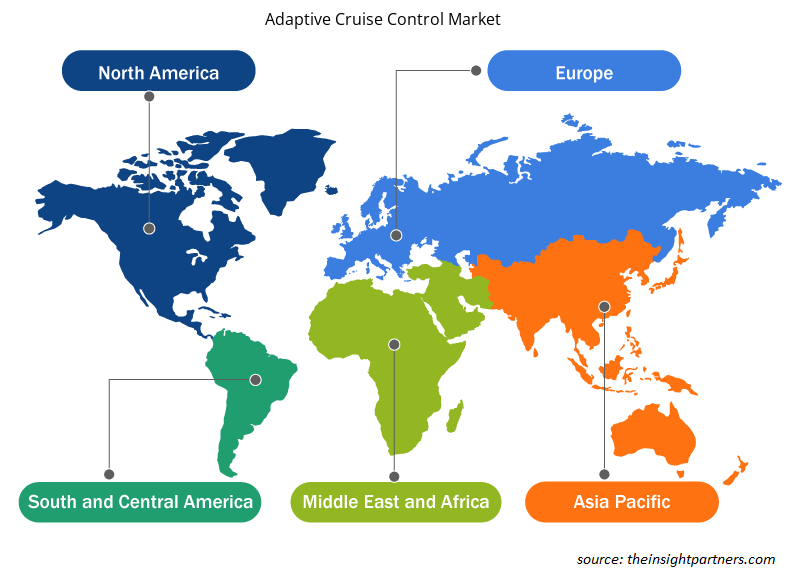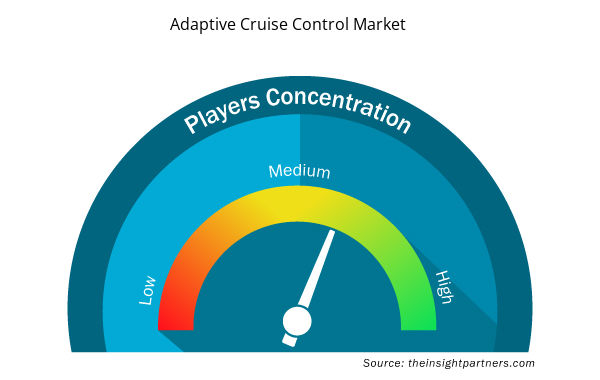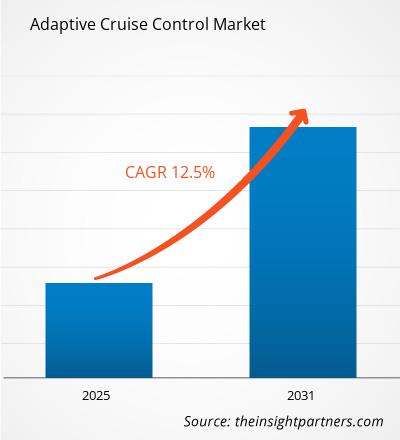The Adaptive Cruise Control Market is expected to register a CAGR of 12.5% from 2025 to 2031, with a market size expanding from US$ XX million in 2024 to US$ XX Million by 2031.
The report is segmented by Technology (LiDAR, Laser, Radar); Vehicle Type (Passenger Cars, Commercial Vehicles), The global analysis is further broken-down at regional level and major countries. The Report Offers the Value in USD for the above analysis and segments.
Purpose of the Report
The report Adaptive Cruise Control Market by The Insight Partners aims to describe the present landscape and future growth, top driving factors, challenges, and opportunities. This will provide insights to various business stakeholders, such as:
- Technology Providers/Manufacturers: To understand the evolving market dynamics and know the potential growth opportunities, enabling them to make informed strategic decisions.
- Investors: To conduct a comprehensive trend analysis regarding the market growth rate, market financial projections, and opportunities that exist across the value chain.
- Regulatory bodies: To regulate policies and police activities in the market with the aim of minimizing abuse, preserving investor trust and confidence, and upholding the integrity and stability of the market.
Adaptive Cruise Control Market Segmentation
Technology
- LiDAR
- Laser
- Radar
Vehicle Type
- Passenger Cars
- Commercial Vehicles
Customize This Report To Suit Your Requirement
You will get customization on any report - free of charge - including parts of this report, or country-level analysis, Excel Data pack, as well as avail great offers and discounts for start-ups & universities
Adaptive Cruise Control Market: Strategic Insights

- Get Top Key Market Trends of this report.This FREE sample will include data analysis, ranging from market trends to estimates and forecasts.
Adaptive Cruise Control Market Growth Drivers
- Increased consumer awareness: As more and more consumers are getting aware of the safety features of vehicles, the demand for sophisticated safety technologies such as adaptive cruise control systems is also increasing. Manufacturers need to equip their vehicles with these systems to meet consumers' expectations and improve the safety rating.
- Regulatory Pressure and Safety Standards: The governments and safety organizations are enforcing strict regulations and safety standards on vehicles. The stringent regulatory environment is making automakers adopt ACC technologies to meet the required safety standards, which is propelling market growth. Governments around the world are implementing more rigorous safety standards for vehicles that are forcing car manufacturers to fit vehicles with advanced safety features like adaptive cruise control. Governments are doing this to curtail road traffic fatalities and improve public safety. In the U.S. and other parts of Europe, governments are now forcing car manufacturers to include ADAS technologies, such as ACC, in new models. For instance, the European Union has required that new cars include such features as automatic emergency braking, which is often used in combination with adaptive cruise control.
- Advancements in Sensors and Radar Systems: ACC systems use a variety of sensors, radar, and camera technologies to detect the distance, speed, and movement of vehicles ahead. Recent advances in these sensor technologies have significantly improved the performance, reliability, and affordability of ACC systems. Radar and lidar technologies have advanced so that ACC systems can more accurately detect objects at higher distances, even in rainy or foggy conditions and night driving. With decreasing sensor and radar technology costs, ACC is being fitted to wider model ranges of vehicles by automobile manufacturers, including mid-range and entry-level models.
Adaptive Cruise Control Market Future Trends
- Traffic Congestion and Need for Convenience: Growing urbanization and increasing road traffic congestion are driving demand for technologies that reduce the stress of driving, especially in stop-and-go traffic. ACC helps because it automatically adjusts to match speed with traffic flow, thus making it quite useful for dense urban or highway traffic. The rising time spent in traffic, especially while commuting, has been encouraging drivers to seek technologies that make driving less tiring. ACC gives the advantage of providing constant speed and proper following distance, thus calling for acceleration and braking less frequently. Low-speed capability is more common in ACCs to enable them to perform under stop-and-go conditions of traffic. This is good because it does not make drivers do too much in heavy traffic as they will just go by the pace.
- Shift Towards Electric Vehicles: The popularity of electric and hybrid vehicles, usually fitting the description of ADAS, also contributes to increasing adoption for ACC. Electric and hybrid vehicles are known for carrying more complex electrical and sensor systems that perfectly complement the functionality that ACC provides. Most electric and hybrid vehicles, especially premium vehicle manufacturers, carry the installation of ACC as standard in the vehicle. This would integrate ACC into the electric vehicles and will support the trend for more intelligent and automated driving systems in the EV market. Electric and hybrid vehicles are mostly marketed for their high-tech features, and ACC is seen as a premium feature that adds value to the vehicle. Sales for electric and hybrid vehicles continue to increase, which means an increasing number of consumers will start accepting ACC.
Adaptive Cruise Control Market Opportunities
- Integration of Automatic Cruise Control (ACC) in Low Cost Vehicles: Initially, ACC was used mainly in luxury vehicles. However, with the decline of the cost of sensor technologies, there is much room to include ACC in middle-class and budget vehicles. Companies targeting middle-income customers, especially in emerging economies, can offer ACC as standard or optional features in budget vehicles, thus significantly increasing the penetration of ACC in the market. In regions such as Asia-Pacific, Latin America, and Africa, where car ownership is fast growing, ACC-equipped vehicles can be launched at relatively lower price points, hence reaching a broader demographic segment.
- Demand from Aftermarket Operations: With increasing ACC adoption, companies are offered the opportunity to supply aftermarket ACC systems that may be fit onto older vehicles where new vehicle sales are less prevalent. Aftermarket firms may design and sell retrofit kits of ACC for vehicles without such an installed facility. This will give them the chance to capture revenue for companies marketing towards drivers who want to enhance safety and comfort of their vehicle. Partnering with service providers for vehicle repair and maintenance to make ACC installation and upgrades available will increase take up for this technology among the older vehicles.
Adaptive Cruise Control Market Regional Insights
The regional trends and factors influencing the Adaptive Cruise Control Market throughout the forecast period have been thoroughly explained by the analysts at Insight Partners. This section also discusses Adaptive Cruise Control Market segments and geography across North America, Europe, Asia Pacific, Middle East and Africa, and South and Central America.

- Get the Regional Specific Data for Adaptive Cruise Control Market
Adaptive Cruise Control Market Report Scope
| Report Attribute | Details |
|---|---|
| Market size in 2024 | US$ XX million |
| Market Size by 2031 | US$ XX Million |
| Global CAGR (2025 - 2031) | 12.5% |
| Historical Data | 2021-2023 |
| Forecast period | 2025-2031 |
| Segments Covered |
By Technology
|
| Regions and Countries Covered | North America
|
| Market leaders and key company profiles |
Adaptive Cruise Control Market Players Density: Understanding Its Impact on Business Dynamics
The Adaptive Cruise Control Market market is growing rapidly, driven by increasing end-user demand due to factors such as evolving consumer preferences, technological advancements, and greater awareness of the product's benefits. As demand rises, businesses are expanding their offerings, innovating to meet consumer needs, and capitalizing on emerging trends, which further fuels market growth.
Market players density refers to the distribution of firms or companies operating within a particular market or industry. It indicates how many competitors (market players) are present in a given market space relative to its size or total market value.
Major Companies operating in the Adaptive Cruise Control Market are:
- AUTOLIV INC.
- CONTINENTAL AG
- DELPHI AUTOMOTIVE PLC
- DENSO CORPORATION
- FORD MOTOR COMPANY
Disclaimer: The companies listed above are not ranked in any particular order.

- Get the Adaptive Cruise Control Market top key players overview
Key Selling Points
- Comprehensive Coverage: The report comprehensively covers the analysis of products, services, types, and end users of the Adaptive Cruise Control Market, providing a holistic landscape.
- Expert Analysis: The report is compiled based on the in-depth understanding of industry experts and analysts.
- Up-to-date Information: The report assures business relevance due to its coverage of recent information and data trends.
- Customization Options: This report can be customized to cater to specific client requirements and suit the business strategies aptly.
The research report on the Adaptive Cruise Control Market can, therefore, help spearhead the trail of decoding and understanding the industry scenario and growth prospects. Although there can be a few valid concerns, the overall benefits of this report tend to outweigh the disadvantages.
- Historical Analysis (2 Years), Base Year, Forecast (7 Years) with CAGR
- PEST and SWOT Analysis
- Market Size Value / Volume - Global, Regional, Country
- Industry and Competitive Landscape
- Excel Dataset



Report Coverage
Revenue forecast, Company Analysis, Industry landscape, Growth factors, and Trends

Segment Covered
This text is related
to segments covered.

Regional Scope
North America, Europe, Asia Pacific, Middle East & Africa, South & Central America

Country Scope
This text is related
to country scope.
Frequently Asked Questions
Some of the customization options available based on the request are an additional 3-5 company profiles and country-specific analysis of 3-5 countries of your choice. Customizations are to be requested/discussed before making final order confirmation, as our team would review the same and check the feasibility.
The report can be delivered in PDF/PPT format; we can also share excel dataset based on the request.
The leading players operating in the Adaptive Cruise Control Market include Aptiv PLC, Autoliv Inc., Continental AG, Denso Corporation, General Electric Company, Honeywell International, Inc., Robert Bosch GmbH, Siemens AG, Valeo SA, ZF Friedrichshafen AG
The Adaptive Cruise Control Market is estimated to witness a CAGR of 12.5% from 2023 to 2031
User Experience and Customization is the key future trend of the Adaptive Cruise Control Market
The major factors driving the Adaptive Cruise Control Market are: Increased consumer awareness#Regulatory Pressure and Safety Standards
Trends and growth analysis reports related to Automotive and Transportation : READ MORE..
1.AUTOLIV INC.
2.CONTINENTAL AG
3.DELPHI AUTOMOTIVE PLC
4.DENSO CORPORATION
5.FORD MOTOR COMPANY
6.HYUNDAI MOBIS
7.MAGNA INTERNATIONAL INC
8.ROBERT BOSCH GMBH
9.WABCO
10.ZF FRIEDRICHSHAFEN

 Get Free Sample For
Get Free Sample For